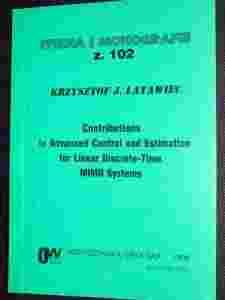19
1. INTRODUCTION
The plethora of available theoretical and practical solutions to the control problem for linear(ized) multivariable discrete-time systems has brought this control branch to the status of a matured, if not classical, discipline. However, in spite of the unprecedented progress in the multivariable control field for square systems (equal numbers of inputs and outputs), for which the system analysis and control design results are unquestionable fAnM, BrY, CaD, Cha, Che, DFT, Fri. Kac, Kai, Kuc, Lew, Mac, MoZ, Nil, Roi, SkP, Tsu, Wo2, ZDGJ, there have been some controversies when analyzing non-square systems and synthesizing their multivariable controllers. There have appeared certain misconstructions resulted from ambiguity of an intriguing notion of zeros for non-square systems. A number of not necessarily equivalent definitions of zeros have been spread throughout the control literaturę, raising discussions, polemics and quarrels. The first goal of this monograph is to present a new, original, control-oriented insight into the problem of zeros for MIMO systems. As a result, a new definition of zeros of a multivariable system is introduced. The so-called Control zeros1 are shown to perfectly extend and generalize the notion of zeros of SISO systems. The control zeros provide a new insight into modelling and control of non-sąuare multivariable systems.
Nowadays, a typical approach to a linear control design problem for multivariable systems is to start from either state-space or AR(I)XZAR(I)MAX models and employ LQR7LGQ or UPC/GPC controllers, respectively. In morę ^mbitious1 attempts, FL-related concepts are often applied, with morę involving computations and a shortage of working full-scale implementations fSPGJ. It sometimes happens that a burdensome numerical maehinery is used to design an advanced controller for quite a simple plant, which might have not necessarily required such sophisticated algorithms for its effective control. An example of a Simple1 plant is an open-loop stable minimum phase one, which can be effectively stabilized with e.g. a (slightly modified) minimum variance controller or IMC-structured controller. And these are very simple controllers which can be implemented using the single-chip microprocessor technology. Numerical simplicity of a control algorithm may be essential for !fasf dynamie systems where ^hort1 sampling periods should be selected.
However, in practical control situations we often face nonminimum phase systems. Moreover, discrete-time representations of minimum phase continuous plants may be nonminimum phase. Therefore it is necessary to account for nonminimum phase behaviour in many realistic control design schemes.
Tytuł:
STUDIA I MONOGRAFIE
z. 102
Contributions to Advanced Control and Estimation for Linear Discrete-Time MIMO Systems
Autor:
KRZYSZTOF J. LATAWIEC
Wydawnictwo i rok wydania:
OFICYNA WYDAWNICZA
POLITECHNIKA OPOLSKA 1998
170+20+10 egz.
Stan: -bdb wyblakla plamka na gornym rogu stron
Oprawa: miękka
Ilość stron i format: 150str.
16,5x24 cm
Ilustracje: rys.
Spis treści:
62 6. CONCLUSIONS
64 APPENDIX A.l
65 APPENDIX A.II
66
68 REFERENCE
70
73
74
77
78
Contents:
6
17 19
SYMBOLS ABBREVIATIONS 1. INTRODUCTION
2. CONTROL ZEROS AND MINIMUM PHASE SYSTEMS 23
2.1. Preliminaries 24
Rationał matńces 24
Generalized inverses, right/left irwerses 25
Prerogative on right-invertible systems 27
System representations 28
Suryeyofdefinitionsofzeros1 29
Constructive counterexamples 32
Output zeroing problem vs. transmission blocking
problem 37
Why not DZ1 through DZ8 when controlling nonsąuare
systems 40
Controlzeros 41
Minimum variance control 46
The case of multiple delays 51
The nonuniąueness issue 53
Perfect regulation 53
Perfect filtering 60
Infimum time control
Closing remarks
3. EXTENDED HORIZON MODEL ALGORITHMIC CONTROL
Extended Horizon Predictive Control
Internal Model Control
Central IMC theorem
Model Algorithmic Control
Open-loop design of feedback EHPC systems
RobustEHMAC
Robustness to parametric uncertainties
Robustness to uncertainties in estimation
oftime delay yg
3.5. Tuning in EHMAC
Tuning the prediction horizon
Tuning the IMC filter parameter
3.6. Closing remarks
4. ROBUST ADAPTIVE L.S. ESTIMATION
Parameter estimation problem
Normalization with covariance matrix
New ALS estimation strategy
Error propagation system
Single-loop vs. cascade estimation
Sąuare-root update of covariance matrbc
Convergence measures
Forgetting methodology
Persistency of excitation
Offset model formulation
Bounded influence regression
New estimation algorithm
Convergence of the new adaptive estimator
Stochastic framework ofanalysis
Conditions for the boundedness ofthe
tracking error
Extended horizon adaptive model algorithmic control
Closing remarks
5. OPEN PROBLEMS
79 79 81 87
91
93
94
95
96
96
98
98
98
99
100
100
101
104
106
107 [zasłonięte] 114
123 [zasłonięte] 129 131 135
"Moja strona" w Allegro
Zobacz inne moje aukcje - SZUKAJ W PRZEDMIOTACH UŻYTKOWNIKA - szybkie wyszukiwanie podobnych tytułów
Uwaga! Na zdjęciach wokół liter możliwe charakterystyczne zniekształcenia - wynik kompresji jpg. W rzeczywistości zniekształcenia nie występują. Możliwe też błędy literowe - z powodu niedoskonałości odczytu OCR, za co przepraszam i liczę na wyrozumiałość.

